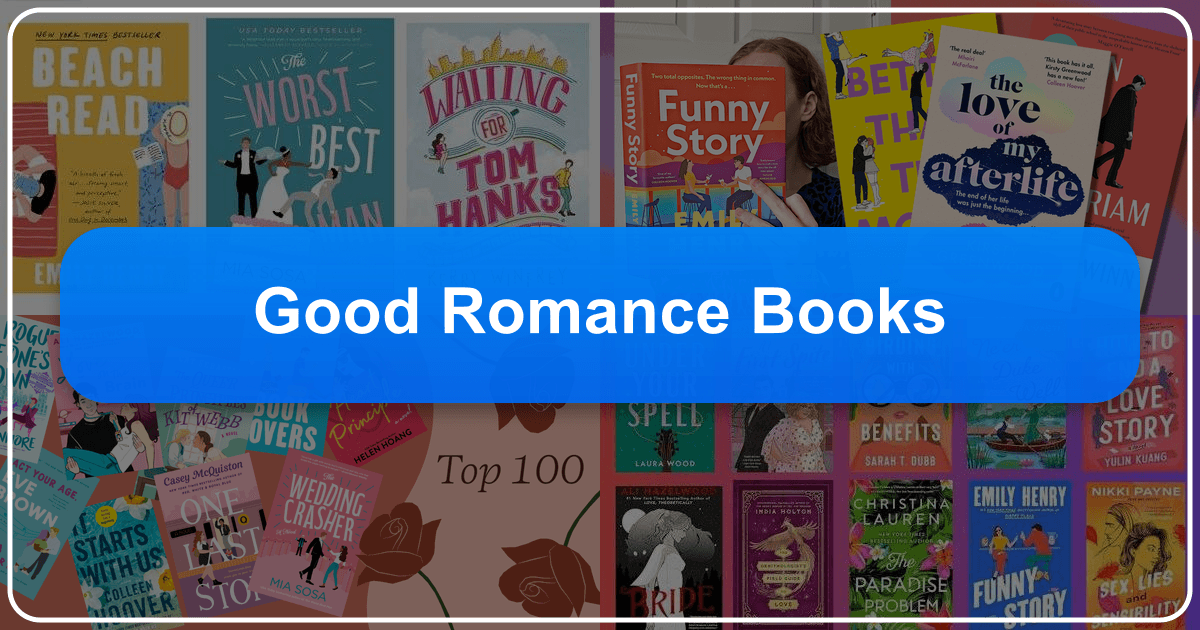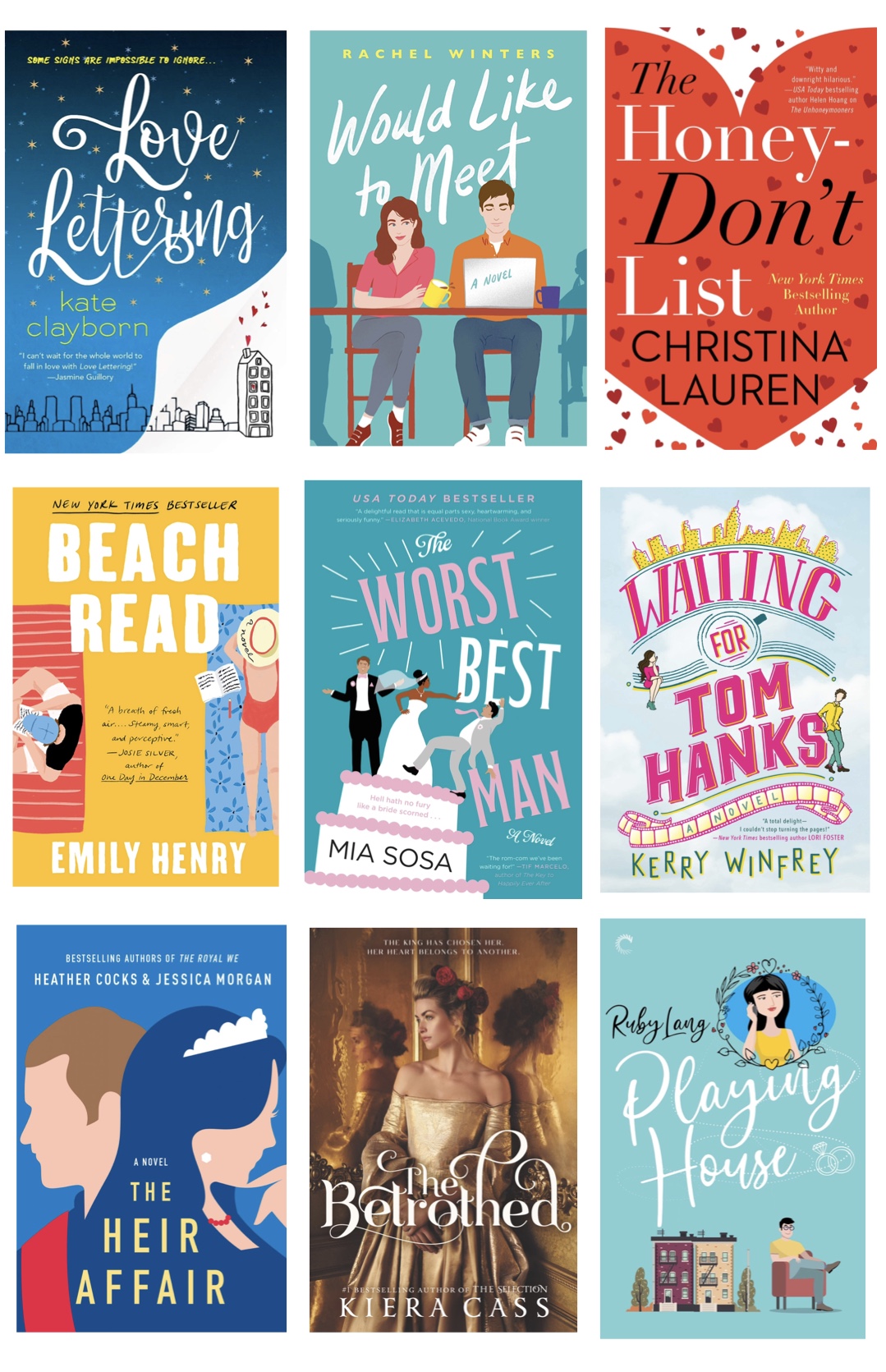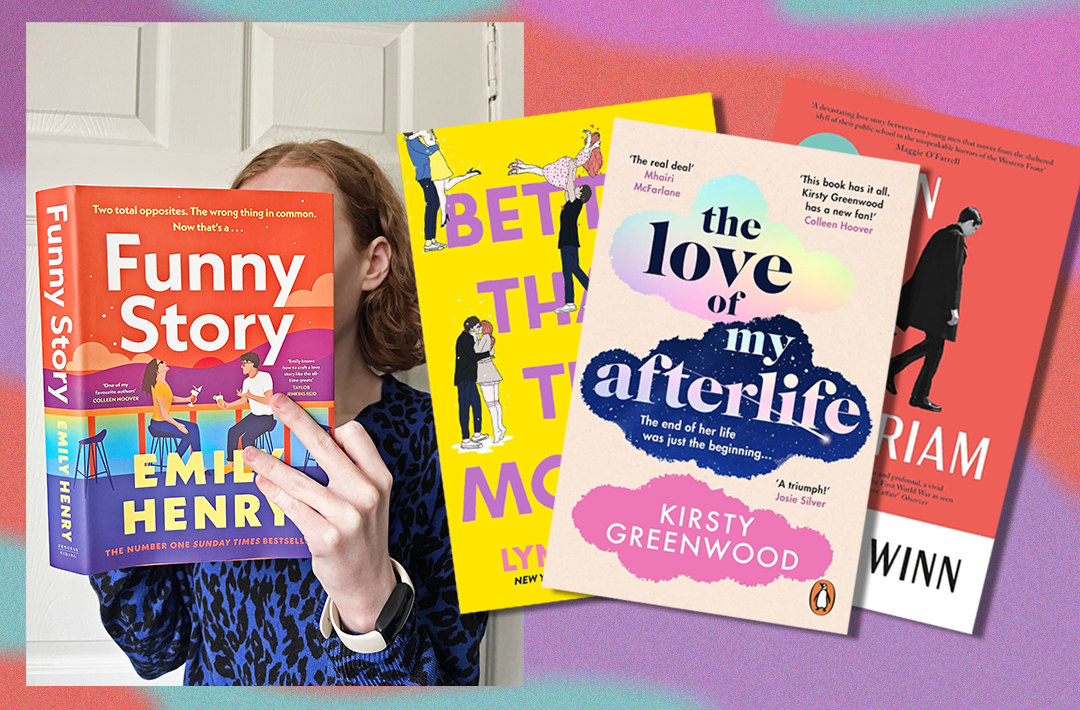Good Romance Books: A Comprehensive Guide to Captivating Love Stories

Romance novels possess a unique power to transport us to enchanting worlds of love, laughter, tears, and dreams. Whether your heart yearns for historical settings, contemporary connections, or LGBTQ+ romances, the allure of a well-crafted love story lingers long after the final page is turned. This extensive guide explores the diverse landscape of romance literature, delving into specific titles, authorial styles, the cultural impact of the genre, and the enriching experience of reading itself. We will journey through classic tales and modern bestsellers, examining their literary merits, emotional resonance, and enduring legacies.

Exploring the Genres of Romance
The world of romance fiction is vast and varied, encompassing numerous subgenres that cater to diverse tastes and preferences. From the sweeping grandeur of historical romances to the relatable intimacy of contemporary love stories, the possibilities are endless.
Historical Romance: A Journey Through Time
Historical romances transport readers to bygone eras, weaving captivating love stories against the backdrop of significant historical events and social contexts. These novels often explore themes of class, societal expectations, and the challenges faced by individuals navigating love amidst historical upheavals. “Pride and Prejudice” by Jane Austen, a timeless classic, exemplifies this subgenre, depicting the evolving relationship between Elizabeth Bennet and Mr. Darcy within the constraints of 19th-century English society. Similarly, “Outlander” by Diana Gabaldon masterfully blends historical detail with a fantastical time-travel element, creating an epic love story spanning centuries. The enduring popularity of historical romance highlights the enduring appeal of exploring love in different historical settings and its ability to illuminate social norms of past eras.

Contemporary Romance: Love in the Modern World
Contemporary romance novels offer a relatable exploration of love in the present day, reflecting the complexities and challenges of modern relationships. These narratives often delve into the intricacies of career aspirations, personal growth, and the ever-evolving dynamics of romantic partnerships. “Red, White & Royal Blue” by Casey McQuiston is a prime example of a contemporary romance that deftly blends humor, political intrigue, and a heartwarming love story. Similarly, “The Notebook” by Nicholas Sparks evokes powerful emotions through its exploration of enduring love amidst class differences. The relatable scenarios and characters within contemporary romances resonate with readers who seek comfort and understanding from reflecting on the complexities of modern love.

LGBTQ+ Romance: Celebrating Diverse Love Stories
LGBTQ+ romance has experienced a remarkable surge in popularity, reflecting a growing awareness and acceptance of diverse romantic relationships. These stories challenge societal norms and celebrate the beauty of love in all its forms. “Call Me by Your Name” by André Aciman is a poignant exploration of first love between two young men in Italy, while “The Song of Achilles” by Madeline Miller reimagines the classic tale of the Iliad through the lens of a profound and tragic romance between Achilles and Patroclus. These novels demonstrate the potential of the genre to promote inclusivity and representation, ensuring diverse readers can find stories that resonate with their lived experiences. These stories are not just romantic tales; they are powerful statements of self-acceptance and the pursuit of love regardless of societal expectations.
Other Subgenres: Expanding the Horizons of Romance
Beyond these primary categories, the landscape of romance fiction expands to include other enthralling subgenres. Paranormal romance weaves elements of fantasy and the supernatural into romantic narratives, often exploring themes of destiny and otherworldly encounters. Romantic suspense blends the excitement of mystery and thriller elements with romantic plots, keeping readers on the edge of their seats. Each subgenre offers unique opportunities for writers to explore the facets of love in captivating and unexpected ways, continually broadening the reach and appeal of the genre.
Delving into the Works of Notable Romance Authors
The success of any romance novel hinges not only on its plot and characters but also on the writer’s ability to craft a compelling narrative and create characters with whom readers connect emotionally. The literary skill of an author significantly influences a book’s impact.
Jane Austen’s Enduring Legacy
Jane Austen’s mastery of social commentary and intricate character development is evident in works such as “Pride and Prejudice” and “Persuasion”. Her novels subtly explore themes of societal pressures, class distinctions, and the complexities of human relationships, establishing a model for many romance authors who would follow. Austen’s influence continues to inspire contemporary authors, demonstrating the enduring power of her storytelling and its relevance across time.
Diana Gabaldon’s Epic Storytelling
Diana Gabaldon’s “Outlander” series is a testament to her ability to weave together historical detail, time-travel elements, and a compelling romance into an epic narrative. Gabaldon’s characters are richly developed, and her storytelling is known for its depth and emotional range. The series’ popularity testifies to Gabaldon’s skill in capturing readers’ imaginations and creating an enduring literary phenomenon.
Contemporary Romance Authors: Modern Voices in Romance
Contemporary romance authors, such as Colleen Hoover, Emily Henry, and Jasmine Guillory, have carved unique spaces within the genre, showcasing diverse voices and perspectives. Hoover’s novels are renowned for their emotional depth and exploration of challenging relationships, while Henry infuses her stories with wit and humor alongside poignant themes. Guillory’s works celebrate strong female characters and often incorporate elements of racial representation and diversity. Their diverse styles and approaches contribute to the genre’s dynamism and its ability to speak to a broad range of readers.
The Cultural Impact of Romance Novels
Romance novels have profoundly impacted culture, extending far beyond the realm of literature. Their influence is visible in various forms of media, social discussions, and the way society perceives love and relationships.
Literary Influence and Adaptations
Countless romance novels have inspired successful film and television adaptations, solidifying their presence in popular culture. The enduring appeal of these adaptations reflects the universal themes explored in romance novels and the continued fascination with love stories on screen. Furthermore, the literary success of romance novels has encouraged new writers, demonstrating the potential of the genre as a lucrative and fulfilling avenue for creative expression.
Awards and Recognition
The growing prestige of romance literature is highlighted by the various awards dedicated to recognizing excellence in the genre. These awards underscore the critical appreciation of romance novels and their literary achievements, challenging the notion that romance fiction is solely escapist entertainment. The recognition afforded by these awards signals a shift in how the genre is viewed, elevating it to a level of literary significance previously denied.
Romance Communities and Fan Culture
The passionate and supportive communities built around romance novels highlight the profound impact of these stories. Readers connect with each other through online forums, book clubs, and social media groups, sharing their experiences and discussing their favorite books. This shared passion creates a sense of camaraderie and further solidifies the genre’s cultural influence.
Reading and Learning from Romance Novels
The experience of reading a romance novel extends beyond mere entertainment. It offers opportunities for reflection, emotional growth, and personal learning.
Educational Value and Life Lessons
Romance novels often explore complex themes relating to love, relationships, and personal identity, offering valuable insights into human behavior and emotional intelligence. The stories can provide frameworks for understanding conflict resolution, communication skills, and the importance of self-awareness in relationships. These educational benefits extend beyond the literal narrative; they stimulate critical thinking about human connections and societal expectations.
Reading Habits and Their Benefits
Engaging with romance novels fosters reading habits that can have positive effects on mental well-being and cognitive skills. The immersive nature of romance fiction helps improve focus, concentration, and vocabulary. Moreover, the emotional engagement with these narratives can foster empathy and enhance emotional literacy.
The Role of Libraries and Archives
Libraries and archives play a crucial role in preserving and promoting romance literature, making these stories accessible to a wider audience.
Public and Digital Libraries: Accessibility and Preservation
Public libraries provide vital access to a wide range of romance novels, ensuring that these stories reach diverse readers. Digital libraries offer additional convenience, allowing individuals to access books from anywhere with an internet connection. Both formats contribute to the preservation of romance literature for future generations, ensuring the legacy of the genre is maintained.
Rare Collections and Archives: Historical Significance
Rare collections and archives safeguard historically significant romance novels, preserving literary heritage and providing researchers with valuable materials for studying the evolution of the genre. These collections allow scholars and enthusiasts alike to delve into the history of romance literature, understanding the socio-cultural context in which these stories were written and how they reflect changing societal attitudes towards love and relationships.
In conclusion, romance novels are much more than simple love stories. They are complex narratives that reflect and shape our understanding of love, relationships, and societal norms. Through exploring various genres, authorial styles, and their cultural impact, we can appreciate the rich tapestry of romance literature and its enduring contribution to the world of storytelling. The immersive experience of reading romance novels offers not only entertainment but also valuable opportunities for personal growth and emotional understanding.